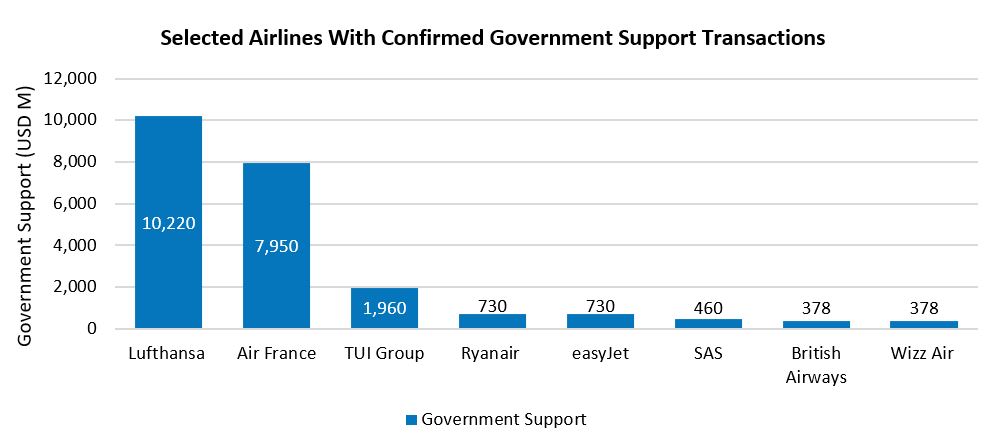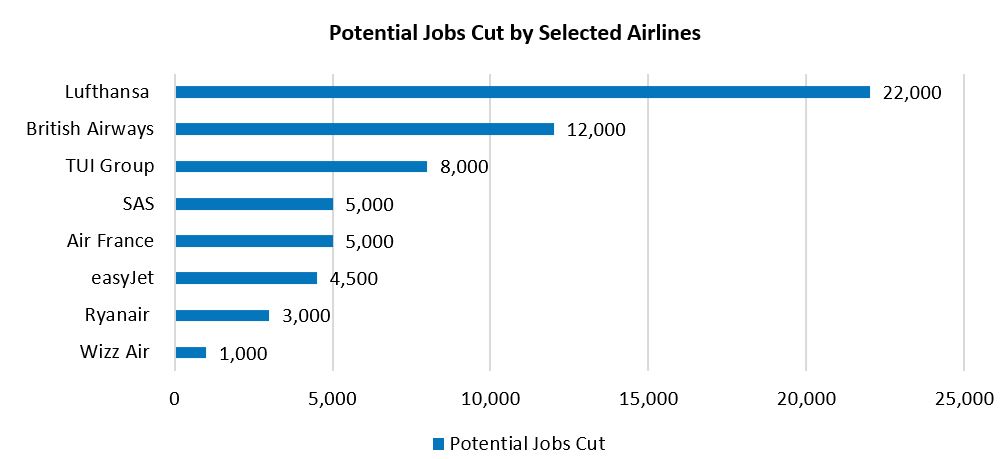15/06/2020
In this short article, IBA's advisory team uses current IATA data together with its own Covid-19 research to spotlight the pandemic's global influence on aviation industry jobs, revenues and capacity and details the extent of government support for some airlines.
IATA expects airline revenues to decline industry-wide by 50% in 2020, falling from USD 838 billion to USD 419 billion. Globally, this is likely to directly affect 25 million of the 65.5 million jobs estimated to depend on the aviation industry. In mitigation, governments around the world have deployed various financial mechanisms including low interest loans, credit facilities and grants.
In late March, IBA's Covid-19 research showed that of 156 airlines being monitored, at least 75 worldwide were operating at a maximum of 10% of their usual capacity and 65 airlines had completely halted their operations. At the end of May, we detected a slight uptick for some of these airlines but most of the increase appears to relate to short-haul and domestic traffic rather than to the international space. The majority of carriers continue to operate at a far lower capacity than usual.
Operating at this reduced capacity has resulted in revenue losses across the industry, IATA estimating that Japan, the United Kingdom and Germany will see their revenues most negatively affected, suffering declines of USD 22.6, 21.7 and 15.0 billion respectively. At the same time, the governments of these three countries also contribute the highest levels of support to their economies in the form of loans, equity injections or spending and tax measures, Germany being the prime supporter. In the USA, most funding is provided through spending and tax measures rather than loans, equity injections or guarantees. However, the overall impact of Covid-19 in the USA remains unclear, especially the effect on regional airlines as mainline carriers move towards reducing their capacities.
The highest impact on jobs is likely to be felt in Asia, India and Thailand suffering potential job losses of 2.9 million and 2.1 million respectively. This is confirmed by the following chart which sets out IATA's estimate of Covid-19's impact on revenue and jobs in selected countries.
.jpg)
At the time of writing, IBA's research recorded approximately USD 55 billion in publicly announced government support transactions for struggling airlines. Lufthansa and Air France-KLM topped the list as the recipients of greatest government support, each accepting USD 10.2 billion and USD 7.9 billion respectively. The funding required some airlines to give stakes to their governments in return for their investment, as high as 20% in the case of Lufthansa. IATA estimates that two thirds of government support was in the form of loans and wage subsidies. The following chart presents those airlines revealed by IBA research to receive government support.

Covid-19's impact on aviation has triggered an unprecedented number of layoffs and furloughs in the industry, IBA recording that at least 170,000 airline jobs have been furloughed or axed entirely. So far in Europe, Lufthansa, British Airways and TUI have announced the biggest potential job cuts, as shown in the following chart. Initially revealing 10,000 potential layoffs in April, the airline has since doubled the number to 22,000. British Airways, who are considering possible job losses of 12,000, follow; at the height of the pandemic, the airline placed approximately 30,000 jobs on furlough under the government's job retention scheme.

The impact of Covid-19 is still unfolding and its overall outcomes are unlikely to be appreciated for some time. We anticipate Q2 2020 results will give an early indication of what to expect for the remainder of the year and foresee government support continuing since it provides airlines with the means to achieve a smoother recovery. However, it is important the assistance stays proportional to the size of the airline so they retain their competitiveness once financial help ceases. It is also apparent that government support does not guarantee redundancies will be prevented: Lufthansa has received significant government support of USD 10 billion but still appears to be planning 22,000 full-time job cuts. Lastly, as airlines begin to fly again, industry job losses like Lufthansa's indicate we should expect recovery to be slow in the near-term and not envisage capacities quickly returning to pre Covid levels.
If you have any further questions, comments or feedback please contact Rami Abdel Aziz
For more information about our Operator Risk Services, please fill out the form below.